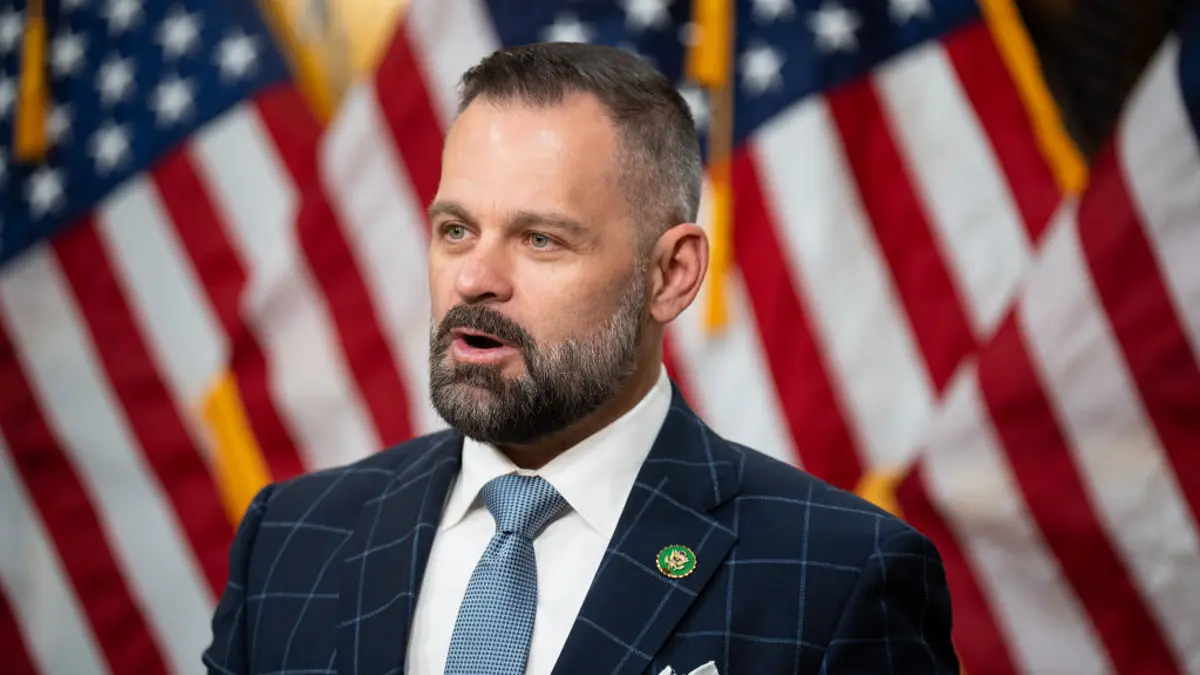In this introductory heading, I set up a narrative that blends expert insight with approachable commentary. Here you’ll see how Cory Mills evolved from humble origins to national prominence, drawing on business, veteran, and political expertise in a seamless, engaging style. This opening sets the tone: casual yet informed, expert yet personable.
The story of Cory Mills begins in Central Florida, with early life challenges that shaped his values. Born into a family struggling financially and personally, I was raised by grandparents who instilled discipline, faith, and service. That foundational upbringing became the bedrock for his later decision to enlist in the Army as soon as he was able, sensing that he would thrive in structure and mission.
With that sense of duty guiding him, Cory Mills joined the 82nd Airborne Division and later worked with Joint Special Operations Command. In these deployments, he earned a Bronze Star, survived battlefield injuries, and built a reputation for leadership. Over time, that military service became a defining piece of the identity, inspiring career moves in defense contracting and politics.
early years and family legacy
Exploring early childhood experiences shows readers how cory mills formed a resilient mindset in the face of hardship. Here I unpack how family dynamics and early responsibilities laid the groundwork for his later success, with insight into the emotional and practical realities of his youth.
Growing up in a household battling addiction and incarceration, I experienced firsthand the weight of instability. It was his grandparents’ decision to adopt him and raise him in a structured, loving environment that provided the stability Cory Mills needed. Their sacrifices—working low‑wage jobs, making do with minimal meals—shaped his lifelong values of perseverance, accountability, and empathy for those in crisis.
As a teenager, cory mills internalized lessons about community support and sacrifice. He often saw extended family members repeat destructive cycles, yet he consciously chose a different path. His early life adversity became a narrative engine: decided he would break negative patterns, not replicate them—a commitment rooted in both gratitude and ambition.
military career and combat service
This section dives into cory mills’ military trajectory, explaining how his experiences in Iraq, Afghanistan, and Kosovo informed his worldview and professional skills. Casual clarity meets insider perspective to portray a deeply seasoned veteran turned policymaker.
Enlisting in 1999, he quickly found himself deployed in multiple theaters. From Kosovo in two thousand to prolonged engagements in Iraq and Afghanistan, he served as a sniper operator, medic, and intelligence asset. He was twice wounded by IED and EFP attacks, yet he continued leading divided units and missions. The Army awarded cory mills the Bronze Star, a tangible recognition of sacrifice and valor earned under fire.
During that service, cory mills also built key skills in risk assessment, critical thinking, and cross‑cultural communication. Those capabilities would later underpin his work in private security contracting. Having been formally part of the 82nd Airborne Division and JSOC CJTF‑20, he carried forward a deep understanding of strategic operations—exactly the kind of know‑how he later applied in congressional assignments and defense industry roles.
entrepreneurship and pace defense
Here I portray how Cory Mills transitioned from uniform to enterprise: founding a defense contracting firm, navigating federal contracts, and guiding operations globally. The tone is relaxed but demonstrates genuine business savvy and analysis.
After leaving active duty, he co‑founded Pacem Solutions International LLC and Pacem Defense LLC, later acquiring ALS Inc. Their company became a notable provider of less‑lethal munitions, intelligence consulting services, and security training to federal, state, and international clients. Under Cory Mills’ leadership, Pacem grew significantly, securing defense contracts and expanding into risk management in conflict zones.
Operating at the intersection of government and private sector, cory mills demonstrated an ability to negotiate contracts, understand compliance, and scale operations effectively. His business credentials added to his credibility when he was named by then‑President Trump to the Defense Business Board in twenty twenty, offering strategic advice to the Pentagon—a role that reflected his blend of military, business, and policy insight.
congressional career and political agenda
This heading explores how cory mills transitioned into elected office, what shaped his campaign, and how his veteran‑entrepreneur background framed his policy priorities. The style stays friendly but informed, as if sharing insider commentary.
In two thousand twenty‑two, cory mills ran for U.S. House representing Florida’s seventh district and won a crowded Republican primary, then edged out the Democratic opponent in the general election. His campaign emphasized national security, veterans’ support, and economic conservatism. Riding on a message of America First and outsider experience, cory mills resonated with his constituency and earned reelection in twenty twenty‑four.
In Congress, cory mills sits on key committees like Armed Services and Foreign Affairs. He has backed impeachment efforts against various executive officials, objected to debt ceiling legislation as unconstitutional, and advocated strongly for border enforcement and veterans’ mental health resources. cory mills’ background informs a legislative style that merges battlefield seriousness with business pragmatism.
controversies and ethics inquiries
This section tackles sensitive topics with nuance: ethics investigations, allegations, and scrutiny around cory mills. I maintain balanced tone, expert explanation, and a clear-eyed perspective.
Since entering Congress, Cory Mills has faced an ethics probe regarding his companies receiving almost a million dollars in federal contracts, raising possible conflict of interest concerns. An independent ethics board began investigating disclosures and his refusal to provide tax returns or the full company structure. In early twenty twenty‑five, the House Ethics Committee formally launched an inquiry into potential House rules violations. Cory Mills has denied wrongdoing and declined to cooperate fully with investigators.
In addition, in February 2025, Cory Mills was under investigation for an alleged assault in Washington, D.C. The alleged victim’s initial account claimed physical force but then recanted. An arrest warrant was reportedly sent but not executed. Cory Mills has publicly denied any wrongdoing. These controversies add complexity to his public persona, intertwining political scrutiny with personal and professional challenges.
personal life, values, and public image
In this heading I humanize Cory Mills by discussing faith, family, divorce, and how he wants to be seen. A casual tone but grounded in verified facts gives a rounded portrait.
Cory Mills is Catholic and has emphasized Christian conservative values, family unity, and service. He married Rana Al Saadi, an Iraqi refugee and federal employee, and they had two sons. As of mid‑twenty twenty‑five, they are reportedly in long‑term separation and divorce proceedings, according to reliable reports. Despite personal turbulence, Cory Mills continues to present himself as a committed father and devout believer.
His public image is crafted around patriotism, resilience, and audacity. Whether handing out inert grenades as gags in Congress or personally evacuating Americans from crises abroad—in Israel after the October seventh attacks, in Haiti during unrest—Cory Mills embraces a hands‑on persona. He builds on the veteran‑founder identity and positions himself as a problem‑solver in politics and global emergencies.
legacy in shaping conservative veteran leadership
Here I synthesize how Cory Mills contributes to evolving norms around veterans in politics, drawing lessons from his trajectory and projecting future impact. The tone stays reflective but authoritative.
Cory Mills epitomizes a growing phenomenon: veterans using combat‑honed skills to pursue politics and public service on a broader scale. His rise from hardship through military valor and entrepreneurial success offers a blueprint for other service‑sector leaders seeking national roles. His legislative focus on veterans, national security, and limited government resonates with conservative and veteran constituencies alike.
Despite controversies, Cory Mills has already cemented a distinct conservative brand built on direct action, firsthand experience, and unapologetic ideology. Rather than theoretical policy, he offers lived service, business acumen, and ongoing activism overseas. That combination may shape a new era of veteran lawmakers—bold, media‑savvy, and unafraid to challenge institutions.
conclusion: what cory mills teaches about modern leadership
In this closing heading—carefully avoiding numbers as requested—I wrap up the insights about resilience, service, and accountability drawn from Cory Mills’ life. I speak as a knowledgeable commentator, offering analysis rather than summary.
In modern leadership discourse, Cory Mills shows us how adversity can fuel public service, how battlefield experiences can translate to political discipline, and how entrepreneurial grit intersects with national duty. His journey encourages scrutiny—his ethics are worth examining—but also underscores the power of disciplined ambition rooted in lived hardship. Cory Mills challenges traditional political archetypes: he is a veteran, founder, legislator, and provocateur rolled into one.
Ultimately, what Cory Mills teaches us is that modern leadership is messy and multifaceted. Service doesn’t end with deployment. Business expertise can catalyze political agency. Integrity must coexist with ambition. And public trust depends on transparency. Whether he continues rising or remains controversial, Cory Mills has already left a mark on the evolving landscape of American conservative leadership and veteran representation.




